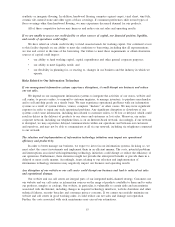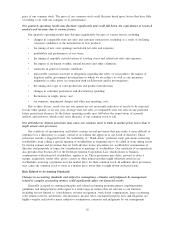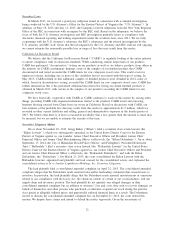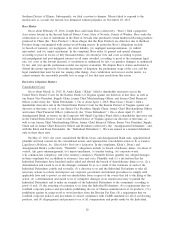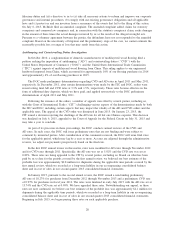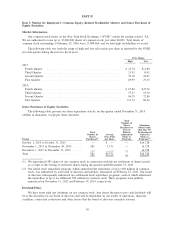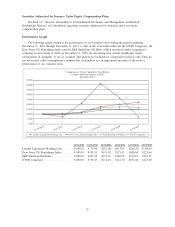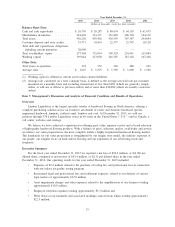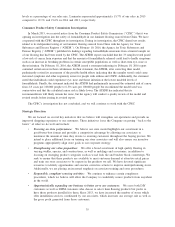Lumber Liquidators 2015 Annual Report Download - page 35
Download and view the complete annual report
Please find page 35 of the 2015 Lumber Liquidators annual report below. You can navigate through the pages in the report by either clicking on the pages listed below, or by using the keyword search tool below to find specific information within the annual report.The defendants in the Wisconsin Action have also moved for protective orders seeking to forestall their
obligation to respond to discovery requests that we promulgated in the Wisconsin Action.
On February 1, 2016, the Wisconsin court stayed the Wisconsin Action in favor of the proceedings in
Virginia. On February 5, 2016, we moved for reconsideration and that motion remains pending.
On February 9, 2016, the Virginia court denied our motion to dismiss. The Virginia court also granted the
remaining insurers’ motion to intervene, but stayed proceedings on their excess and umbrella insurance
policies pending resolution of the primary insurers’ claims.
Litigation Relating to Abrasion Claims
On May 20, 2015, a purported class action titled Abad v. Lumber Liquidators, Inc. was filed in the
United States District Court for the Central District of California and two amended complaints were
subsequently filed. In the Second Amended Complaint (‘‘SAC’’), the plaintiffs (collectively, the ‘‘Abrasion
Plaintiffs’’)seek to certify a national class composed of ‘‘All Persons in the United States who purchased
Defendant’s Dream Home brand laminate flooring products from Defendant for personal use in their homes,’’
or, in the alternative, 32 statewide classes from California, North Carolina, Texas, New Jersey, Florida,
Nevada, Connecticut, Iowa, Minnesota, Nebraska, Georgia, Maryland, Massachusetts, New York, West
Virginia, Kansas, Kentucky, Mississippi, Pennsylvania, South Carolina, Tennessee, Virginia, Washington,
Maine, Michigan, Missouri, Ohio, Oklahoma, Wisconsin, Indiana, Illinois and Louisiana. The SAC alleges
violations of each of these states’ consumer protections statutes and the federal Magnuson-Moss Warranty Act,
as well as breach of implied warranty and fraudulent concealment. The Abrasion Plaintiffs did not quantify
any alleged damages in the SAC but, in addition to attorneys’ fees and costs, seek an order certifying the
action as a class action, an order adopting the Abrasion Plaintiffs’ class definitions and finding that the
Abrasion Plaintiffs are their proper representatives, an order appointing their counsel as class counsel,
injunctive relief prohibiting us from continuing to advertise and/or sell laminate flooring products with false
abrasion class ratings, restitution of all monies it received from the Abrasion Plaintiffs and class members,
damages (actual, compensatory, and consequential) and punitive damages.
We filed a motion to dismiss the SAC and the Abrasion Plaintiffs filed a motion for leave to file a
corrected SAC. Our motion was subsequently granted in part and denied in part. The court also denied the
Abrasion Plaintiffs’ motion for leave to file a corrected SAC. The Abrasion Plaintiffs have until March 1,
2016, to file a Third Amended Complaint. We dispute the Abrasion Plaintiffs’ claims and intend to defend
these matters vigorously. Given the uncertainty of litigation, the preliminary stage of these cases, the legal
standards that must be met for, among other things, class certification and success on the merits, we cannot
estimate the reasonably possible loss or range of loss that may result from these actions.
Morris Matter
On or about August 18, 2015, Kevin Morris (‘‘Morris’’) filed a purported class action lawsuit in the
Circuit Court of the Twentieth Judicial Circuit in St. Clair County, Illinois alleging that the Casa de Colour
Collection by Dura-Wood flooring (the ‘‘Morris Product’’), a brand of solid wood flooring sold by us, is
defective due to warping, cupping and buckling. Morris alleges that we have engaged in unfair business
practices and unfair competition by falsely representing the quality and characteristics of the Morris Product
and by concealing the Morris Product’s defective nature. In particular, Morris’s allegations include (i) common
law fraud, (ii) breach of implied warranty, (iii) breach of express warranty, (iv) breach of contract, (v) breach
of duty of good faith and fair dealing, (vi) violation of the Illinois Consumer Fraud and Deceptive Business
Practices Act (the ‘‘ICFA’’) and (vii) violation of the Uniform Deceptive Trade Practices Act (the ‘‘UDTPA’’).
Morris did not quantify any alleged damages in his complaint but, in addition to attorneys’ fees and costs,
Morris seeks (i) certification of the purposed class, (ii) injunctive relief requiring us to replace and/or repair
all Morris Products installed in structures owned by the purported class, (iii) an award of compensatory,
consequential and statutory damages, pre-judgment interest and post-judgment interest, (iv) a declaration that
we must disgorge, for the benefit of the purported class, all or part of our profits received from the sale of the
Morris Product and/or to make full restitution to Morris and the purported class, (v) a judgment for actual
damages for injuries suffered by Morris and the purported class as a result of our violation of the ICFA and
(vi) a judgment awarding Morris and the purported class reasonable attorneys’ fees and costs in accordance
with the UDTPA. On September 25, 2015, we removed the action to the United States District Court for the
25


